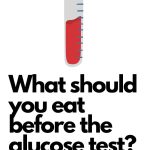📣 YOU are clearly getting prepared for pregnancy, birth & beyond — but do you wish your partner was more involved (looking for a teammate rather than just a cheerleader)? Couples love THIS! 💛🧡💚
Your glucose test in pregnancy is VERY important. Gestational Diabetes can be a silent killer for both you and your baby, so having the test is not something you want to miss. BUT, what do you eat beforehand to make sure you’re doing the test right
As a note, I’ve taken this test on my own SEVERAL times, and I feel for you. It’s literally the worst but there are a few tips I think that might help you. As a reminder, NO “proper” eating will change the results if you have gestational diabetes, nor should they.
This is just a part of my series on The Pregnancy Glucose Test For Gestational Diabetes << be sure to read that post for ALL the info on that important test!
What Should I Eat Before My Diabetes Test
This is tricky, because SOME diabetes tests need to be taken on an empty stomach. This means that they want a FASTING glucose test.
That means they’re checking to see how much glucose (sugar) is in your blood when it’s been 8-12 hours since you last eat.
This is an important part of your health history. In fact, I took the test and because just my fasting glucose was up, they encouraged me to eat a diabetic diet for my pregnancy. A high fasting glucose can be an indicator (alone) of issues processing sugar in your body.
However, most often they don’t order a fasting test for pregnant woman. BUT, check with your provider about if you can eat in advance.
However, the 3-hour test is imperative that you fast in advance. More on that one below.
So, before your test be SURE to ask your provider if it is OK to eat in advance of the test.
If you CAN eat…. let’s give you some ideas:
Examples of what to eat before your pregnancy glucose test (if it’s OK):
You’re going to want to balance your carbohydrates and proteins in your meals. So, some good examples are:
- Salad with a good amount of protein (nuts, chicken etc) and a non-sugary dressing (and not a bunch of fruit — dried or otherwise in the salad)
- Egg & toast
- Toast & peanut butter
- Cheese and nuts
Bad things to eat before your pregnancy glucose test:
These types of items might throw the test off, and that wouldn’t be good at all:
- Sugary sodas (honestly, I’d avoid all types of soda the day of the test, but that’s a personal choice — I feel like even artificial sweeteners can mess with it)
- Sugary cereals
- Granola Bars (unless it is well-balanced)
- Any meals that has more carbohydrate than protein
- Juice
- Fruit with no balancing protein
If you’re not sure eat something with a lot of protein and you should be good to go.
Making good choices BEFORE your test is one of my ways to not fail your glucose test.
If you have ANY doubt at all, ask your provider when they order the test what they think you should be eating. Be sure to talk with them in advance!
I also have a whole post on how to pass your pregnancy glucose test.
BTW, if you’re at this testing spot in your pregnancy, you might be wondering about the OTHER test they may order here on out and I talk all about those in my free beginning prenatal class.
How is the Diabetes Test Done
The gestational diabetes test is normally ordered around 28 weeks, but if you have issues including previous larger babies, a close family tie that has diabetes or other issues they may recommend you take it earlier (I took it at 10 weeks with my last baby because I had a 9 pound baby previously).
They may take a fasting blood sugar (more on that below), and then everyone drinks a sugar drink (some people believe this can be done with jelly beans or other “more fun” ways — but the true standard to make sure you’re getting the right amount of sugar is the drink).
They then take your blood sugar at regular intervals.
If you’re just having the 1-hour test (most people have that test first) you’ll just have the one blood draw and then you’re done.
If you’re doing the 3-hour test you’ll have blood taken before the drink (most often fasting), and then at 1 hour, 2 hours and 3 hours after drinking it.
Most labs will want you to stay within the lab for this process. They will likely also have other guidelines like not smoking, eating, drinking (most often you can have water), or exercising during the test — just to make sure it’s accurate.
If you loving having a heads up what will go on, I recommend this — it is really the EASY way to get prepared for the rest of it!
Looking to get prepare for your birth? I have some easy options for you!
~~~~~~~~
– Worried you’re missing something? Grab my pregnancy planner so you don’t miss a thing!
– Thinking about an induction? Grab Inductions Made Easy to feel prepared in just 20 minutes!
– Wondering how to get that baby OUT? Grab Going Into Labor Made Easy so you know how to (and not to) do it!
– Postpartum got you anxious? Check out Postpartum Care Made Easy so you can stay SAFE even when all your attention is on that little on.
🚨 AND if ALL OF IT has got you on edge The Online Prenatal Class for Couples is perfect for you — You’ll feel so ready before you even know it!
~~~~~~~~
No matter WHERE you are at in your pregnancy journey, we have resources that can help!
Ok, keep going though, we’re going to talk about diabetes for a bit…
What is Gestational Diabetes
Gestational Diabetes is an issue when your body isn’t able to deal with the sugar in your system effectively. Most often it is not producing enough insulin to cover all of it (insulin is needed to help your cells use the sugar in your body — without it, the sugar just hangs out in your blood stream). but sometimes your cells are extra resistant to letting sugar in.
It is the same issue for people with Type 1 or Type 2 diabetes, but this one is caused by strain and hormonal changes of pregnancy.
What Can Diabetes Do?
As you can imagine, leaving sugar on your counter is an invitation for ants to come find it.
It is similar in your bloodstream. It just kind of messes with the walls of your veins and arteries. It also makes it so you may have periods of really high blood sugar (which won’t make you feel good), and then sometimes really low blood sugar (hypoglycemic — I bet you know that feeling — when you feel shaky and just know you need to eat ASAP). Going between those two extremes can make you feel miserable, especially during pregnancy.
For the baby, you’ve got to think that it’s also getting those very high amounts of sugar — where it takes a lot and grows quickly, but then it is also affected if you end up hypoglycemic.
These babies often end up large and can have issues stabilizing their own sugars when they are born.
It can also be problematic for the organs and things that formed as they were growing inside of you. It can increase your chances of stillbirth.
This study shows that increase in stillbirths, especially in undiagnosed diabetes
Can I say again how IMPORTANT it is to take the test. It really is SO important, and if you’re listening to someone who says not to take it that isn’t a person who’s opinion you want to value.
How to they Treat Gestational Diabetes?
The good news is that most people don’t have to take insulin, but you will need to take your blood sugars a few times a day to make sure that you’re doing the things needed to keep your blood sugar stable. It is treated in a few different ways:
Diet controlled Gestational Diabetic
These people work to not eat too many carbohydrates in one meal. It is important that you talk with your dietician (or, whoever is talking to you about your diabetic plan) to see how many grams of protein is good for you at a meal or at a snack.
And then follow that, making sure to balance it out with proteins.
This may mean that you limit some fruits and sugary items for the duration of your pregnancy. However, it’s not long and after delivery you can likely return to your previous diet.
Honestly, I followed this diet for 31 weeks of my last pregnancy and when I followed what she said I felt SO much better, it really made me grateful I had those guidelines just for me!
Oral Medication-controlled gestational diabetic
These people are usually on Glucophage (also called Metformin). They take it a few times/day (as prescribed) to help their body accept that sugar more readily that’s in the blood stream.
Insulin controlled gestational diabetic
These people inject insulin into their arms/belly a few times a day. Normally, they try the other types of control options before you are put on insulin. This is fairly rare, but not too uncommon anymore.
AND quick reminder if you’re at the glucoses testing phase you’re close to (or at) the kick count phase so grab my cheat sheet here:
Will I have Diabetes the Rest of my Life?
The good news is that most often after the placenta is removed and the strain of pregnancy is done. Your body and pancreas return to making insulin as it did before.
Some people (especially those who ended-up having to use insulin) may end up needing further testing to see if they were actually diabetic before pregnancy too.
BUT, the stark reality is that pregnancy mimics similar to how your body will handle the stresses of being older — meaning in 20-30 years you are looking at possibly being diabetic. So, talk with your provider about things you can change in your lifestyle to make you less prone to diabetes.
Be sure to talk with your family members to find out if any family members have diabetes, even if they just take a pill for it. Genetics is strong tie with you possibly getting it as well.
Failing Your Glucose Test
Let me remind you that you’re not “failing” — your body just has a LOT of stress on it with the baby. So, it’s not making insulin like it used to.
And the GOOD news is that you can do things to keep both you and the baby healthy.
What if I Fail the 1-Hour Glucose Test?
Normal Values for the 1-hour glucose test (after a solution with 75 mg of sugar)
- Fasting: Less than 95 (if they check this)
- 1 hour: Less than 140
If your values fall outside this they will likely have you take the 3-hour test.
However, if your 1 hour glucose is high enough (usually over 200) they may just diagnose you with diabetes and make you an appointment with someone who can make an eating plan for you.
What if I Fail the 3-Hour Glucose Test?
Normal Values for the 3-hour glucose test (this has a more sugary drink with 100 mg of sugar, so the #’s are different):
- Fasting: Less than 95 (if they check this)
- Hour 1: Less than 180
- Hour 2: Less than 155
- Hour 3: Less than 140
You actually two of these numbers to be wrong to be diagnosed with gestational diabetes. So, let’s say hour 1 you’re at 190, but the other two are lower, then you should be good to go.
However, if you’re failing any of these, talk with your provider to see if they have tips for you to eat in the most healthy way for you and the baby. That’s the key with this one.
I Felt Horrible After The Pregnancy Glucose Test
Ok, this one’s a personal experience — but both times that I have taken the 3-hour glucose my blood sugar goes into a range where most people would be in a coma. But, instead I’m driving around picking up other kids and feeding them, etc.
Pro Tip: Make SURE that you have a great snack in your car after the glucose test. Personally, I found a peanut butter and jelly sandwich was good as it had the protein from the peanut butter, plus the sugar hit from the jelly. Eat it IMMEDIATELY upon completion of the test (and not before) so that you balance out all the sugar that your body has just processed.
I honestly think I went into a coma after my second child’s 3-hour glucose test, and I wonder if it’s a bigger problem than just me. I haven’t actually seen anyone’s results as bad as mine, but that pro tip should help a lot!
My doctor actually said I should never take that test again — and it makes me wonder why we can’t come up with some test that seems less risky and annoying, but so far — this is the test we have.
And it’s super important.
You know what else is important? If you’re around 28 weeks, I have to ask — have you taken a prenatal class? While not quite as important as the glucose test, it is really important. In fact, people who take a class decrease their chance of a cesarean section by 10% — crazy right?
The simple way to get prepared for your birth is The Online Prenatal Class for Couples. It is WAY more fun than the glucose test (not a lot of competition there though), it can be done in just 3 hours and many couples describe it as fun — which is just how I wanted it.
Want to do a vibe check before diving into the whole thing with me? — check out my free labor pro tips. It’s your first step toward getting in the driver’s seat of your birth.










 Best Pregnancy Podcasts: Top listens for moms before birth
Best Pregnancy Podcasts: Top listens for moms before birth
